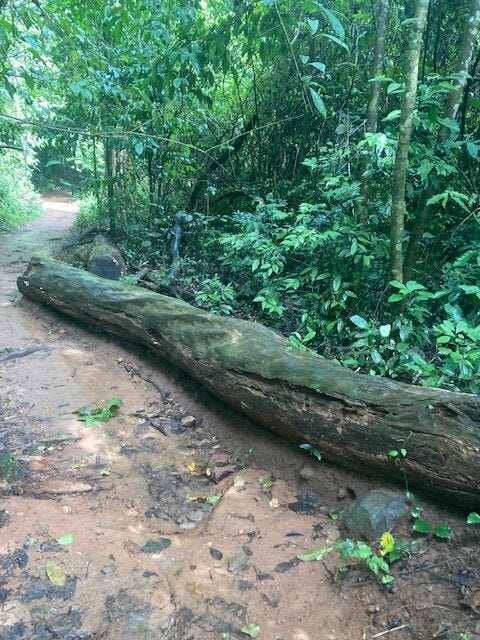Compassion for Nature
I had the opportunity to visit Bhoothathankettu, a site of a natural dam, a week ago with my family. That's when I realized the power of nature to reclaim its place in the world.
The best way to appreciate the place is to embark on a forest trail at the site. We took the chance and hired a local guide for the purpose. His name was Shankaran, an alternate name for the god, Siva.
I have written about my interests in hiring a guide earlier.
Shankaran was a cheerful man in his sixties. He was short, stout, and strong. More importantly he lived by the side of the forest and did this for over four decades.
He was a man full of stories-of celebrities whom he had guided at the site, of cameo roles he had undertaken for movies shot in Bhoothathankettu, of ordinary families like us and their quirks, of the government and their policies towards forests, of the forest department and their competence etc.
He showed us trees that were several hundred years old, plants that were medicinal, trees whose tubular branches held water should we get stranded in such forests, and the diseases in trees (he called them 'cancer').
At one point, he stopped and showed us a log fallen near the trail. It had been lying there around for over three decades. He also called it a 'Lover's Bench' since many young couples have sat on it to while away their time. He also noted that couples these days just sit there, take a selfie, and leave. Shankar knew how the times were changing.
What drew me to the log was not the fact that it was lying on the trail for three decades but the reason why it was untouched by the forest department.
Shankar said that the forest department was, probably, a year late in taking action in removing the log from the trail. By the time they came, they noticed an eco-system develop and start to thrive around the log. There were insects and creatures all around it. In fact, there developed a lot of life and activity underneath the log.
The forest department, seeing new and reorganized life around the log deliberated over it and decided not to remove the log from the site.
Shankar was passionately animated as he was talking by now.
He halted, turned around, and said in Malayalam, "The fallen log is not dead. Even this log has life. The log has rights. And so do the animals, insects, moss, fungus, and weeds that are thriving around it. They all have rights. They have the right to live in their land. No one can take that way from them!"
Being a justice professional who is constantly thinking through violation of rights, his passion took me by surprise. It made me think afresh how rights cannot be restricted to humans alone. There is an entire life-system out there of which humans are only a part.
Isolating humans alone and working on their rights really does not solve even human rights because humans are linked inextricably to the entire eco-system. An abuse of nature by humans at one end of the globe does affect humans at the other end of the globe.
This should not be hard to understand. It is strange that people see how the fluctuation of dollar value affects a shopper in Tokyo, how the inadequate supply of fossil fuels in Saudi Arabia affects the normal Indian office goer, and how a war in Ukraine affects a builder in Lahore, Pakistan.
Everything is connected. We must examine all our knowledge and action through a wider systems lens.
The Bible says in Ps. 24:1 "The earth is the Lord's, and everything in it, the world and all who live in it." To see the world as the Christian/Hebraic God sees and to value the whole world as the Christian God would, is something that would benefit humanity.
This valuation of all that is in the world would lead to a compassion on nature in ways that have not been exhibited before. We would be less selfish when we observe how our actions have wider consequences.
Spending time in nature, interacting with it through touch and smell, using them with respect and gratitude, and nurturing the balance within the system are things human beings can be sensitive to as part of the stewardship of the precious resources.
The moment we distance ourselves from the tangibility of these, we become insensitive, leading to a warp in our perception from a devaluation of everything else. We end up submitting to the selfish core that pulsates and waits to deharmonize and demonize everything.
From that vantage point we become god and our mantra becomes "The earth is mine, and everything in it, the world and all who live in it."


